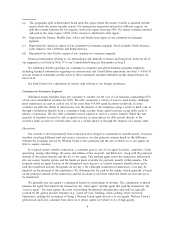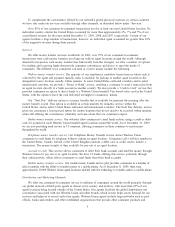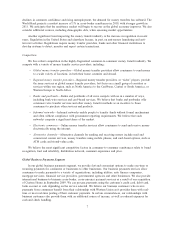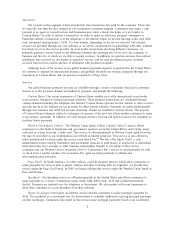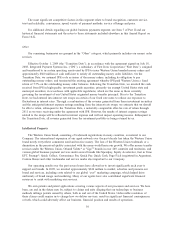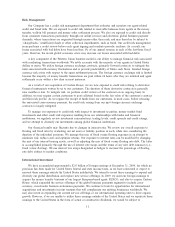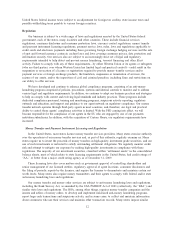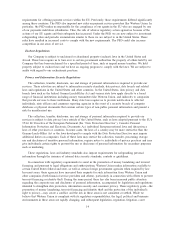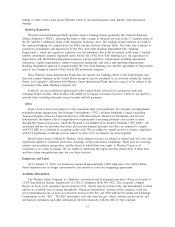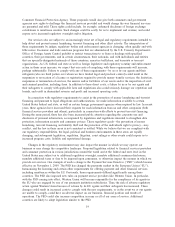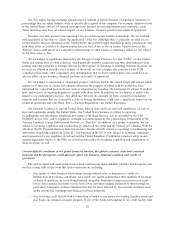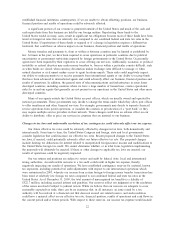Western Union 2009 Annual Report Download - page 26
Download and view the complete annual report
Please find page 26 of the 2009 Western Union annual report below. You can navigate through the pages in the report by either clicking on the pages listed below, or by using the keyword search tool below to find specific information within the annual report.United States federal income taxes (subject to an adjustment for foreign tax credits), state income taxes and
possible withholding taxes payable to various foreign countries.
Regulation
Our business is subject to a wide range of laws and regulations enacted by the United States federal
government, each of the states, many localities and other countries. These include financial services
regulations, consumer disclosure and consumer protection laws, currency control regulations, money transfer
and payment instrument licensing regulations, payment service laws, rules, laws and regulations applicable to
credit cards and electronic payments including those governing foreign exchange hedging services and the sale
of spot and forward currency contracts, escheat laws and laws covering consumer privacy, data protection and
information security. Our services also are subject to an increasingly strict set of legal and regulatory
requirements intended to help detect and prevent money laundering, terrorist financing and other illicit
activity. Failure to comply with any of these requirements—by either Western Union or its agents or subagents
(who are third parties, over whom Western Union has limited legal and practical control)—could result in the
suspension or revocation of a license or registration required to provide money transfer services and/or
payment services or foreign exchange products, the limitation, suspension or termination of services, the
seizure of our assets, and/or the imposition of civil and criminal penalties, including fines and restrictions on
our ability to offer services.
We have developed and continue to enhance global compliance programs, consisting of an anti-money
laundering program comprised of policies, procedures, systems and internal controls to monitor and to address
various legal and regulatory requirements. In addition, we continue to adapt our business practices and strategies
to help us comply with current and evolving legal standards and industry practices. These programs include
dedicated compliance personnel, training and monitoring programs, suspicious activity reporting, regulatory
outreach and education, and support and guidance to our agent network on regulatory compliance. Our money
transfer network operates through third-party agents in most countries, and, therefore, our legal and practical
ability to control those agents’ compliance activities is limited. With the PSD coming into effect, we will
become responsible for the compliance of our agents in the EU who are engaged by one of our payments
institution subsidiaries. In addition, with the acquisition of Custom House, our regulatory requirements have
increased.
Money Transfer and Payment Instrument Licensing and Regulation
In the United States, most states license money transfer services providers. Many states exercise authority
over the operations of our money transfer services and, as part of this authority, regularly examine us. Many
states require us to invest the proceeds of money transfers in high-quality, investment grade securities, and our
use of such investments is restricted to satisfy outstanding settlement obligations. We regularly monitor credit
risk and attempt to mitigate our exposure by making high-quality investments in compliance with these
regulations. The majority of our investment securities, classified within “settlement assets” in the consolidated
balance sheets, most of which relate to state licensing requirements in the United States, had credit ratings of
“AA-” or better from a major credit rating agency as of December 31, 2009.
These licensing laws also cover matters such as government approval of controlling shareholders and
senior management of our licensed entities, regulatory approval of agent locations, consumer disclosures and
the filing of periodic reports by the licensee, and require the licensee to demonstrate and maintain certain net
worth levels. Many states also require money transmitters and their agents to comply with federal and/or state
anti-money laundering laws and regulations.
Our money transfer and money order services are subject to anti-money laundering laws and regulations,
including the Bank Secrecy Act, as amended by the USA PATRIOT Act of 2001 (collectively, the “BSA”) and
similar state laws and regulations. The BSA, among other things, requires money transfer companies and the
issuers and sellers of money orders, to develop and implement risk-based anti-money laundering programs,
report large cash transactions and suspicious activity, and in some cases, to collect and maintain information
about consumers who use their services and maintain other transaction records. Many states impose similar
12




